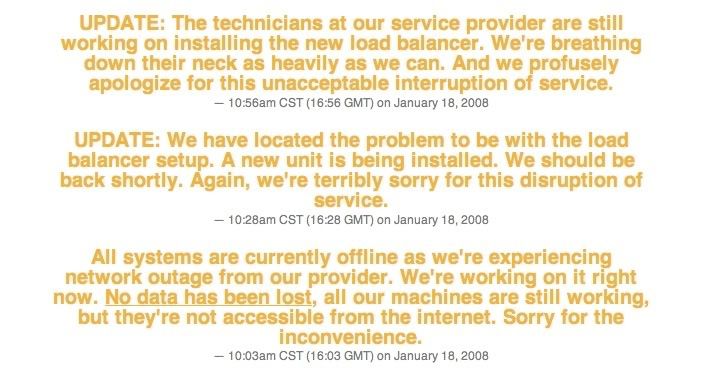I love thinking of different ways to be more mobile (or “location independent“) as a translator. One of the ways I do this is by trialling different web-based applications to see which best suit my needs. For example, I’m currently using Backpack, an organiser with a calendar, to do lists, notes, etc. to help me stay on top of both work and personal tasks.
So you can imagine how I felt last Friday when I logged in see to this (read from the bottom up):
Thankfully, I hadn’t been left high and dry. I’ve been using Backpack with PackRat, an application which works with Backpack, but which stores all your information on your computer like any other application. This meant I was able to access my information as usual, with no excuse not to get cracking on my to-do list. Phew.
So why is this remotely blog-worthy? This experience probably confirms the worst fears of a whole lot of people, but it hasn’t put me off using web-based tools and I’m convinced that it shouldn’t deter anyone else either.
Even before Friday, I was never seriously worried about my data being irretrievably lost. I’ve carried out my due diligence and I figure that the makers of Backpack are no more likely to lose my data than I am (and even less likely than the UK government, by all accounts). Nor am I excessively concerned about my personal data being “held” and potentially used for sinister commercial reasons – I don’t particularly like the idea, but I don’t buy the misinformed conspiracy theories either. I view it the same way I do my accounts with eBay, Amazon, Hotmail, or any other wonder of the internet age. Anything that important, or that confidential, is backed up and/or not uploaded in the first place. (I’m not using Backpack to store translations or client documents, for example.)
Most of all, there really is no excuse for not backing up regularly, especially as a professional with responsibility to your clients. Backpack’s outtage just emphazises that moving data server-side doesn’t relieve us of this responsibility. We can’t control when the technology is going to fail, we only know that it will; so shame on us if we’re caught out. It’s an oldie, but a goodie.


